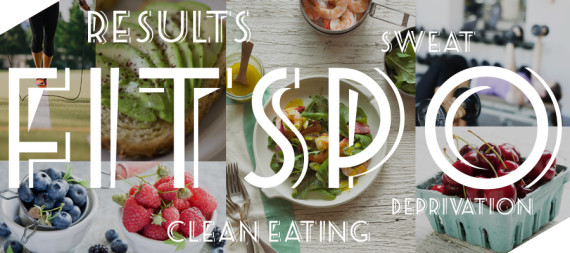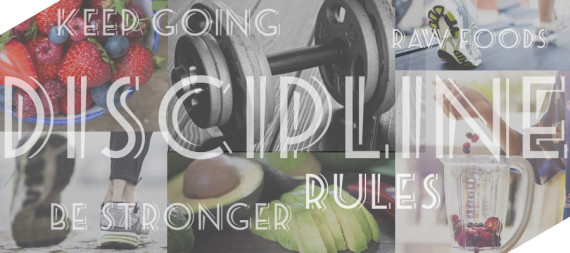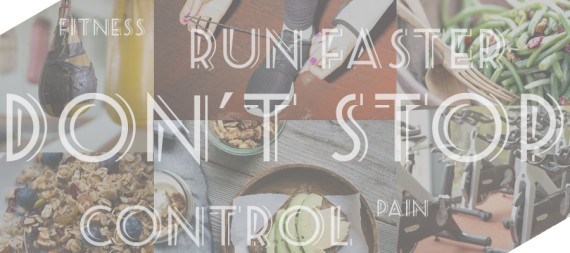
This article contains language and graphic descriptions that may be triggering for those who struggle with disordered eating.
Just a few months ago, Sheena Lyonnais was seeking motivation to get off her couch and lose a few pounds. She wasn't overweight, but like many twenty-somethings, she felt she had grown sluggish and depressed. She simply wanted to get in shape so she would feel better. Plus, there was the allure of reaching her goal weight by her looming 27th birthday.
That's when she discovered fitspo.
Fitspo, short for fitspiration, is an online community of bloggers and social media accounts that encourage weight loss, diet and exercise through the sharing of success stories, active lifestyle and diet tips, photos and rules. Lots and lots of rules.
As a web writer, it was natural for Lyonnais to look online for support, and pretty quickly she was spending hours combing through Tumblr to find tips and "inspirational" messages instructing her to strive to be better through fitness. These mantras were primarily superimposed over photos of the "ideal" body type: rock hard, thin female figures. After countless hours taking in mantras like "I can because I think I can" (coupled with an image of a Nike-clad thigh gap) and "Junk food satisfies you for a minute -- being fit satisfies you forever," she was motivated to begin running and eat healthier.
Somewhere along the line, however, "the messaging started to get lost in translation," Lyonnais, who lives in Toronto, told The Huffington Post. She maintained her own fitspo Tumblr account, or "Fitblr," and she was following countless others. Even though she was running every single day, she started to feel that everything she did wasn't enough in comparison to the women on her dashboard. She began using multiple apps to track her calories and workouts. Her thoughts were dominated by all of the numbers she entered into her phone: Did I run enough miles? Did I run them fast enough? Did I eat too many calories today?
"There were just too many numbers in my head," Lyonnais said. "I didn't want to look at an egg as being 70 calories. I needed to look at it as something that's nourishing and good for my body."
So she stopped calculating, deleted her Fitblr account and wrote about her experience in a personal essay for xoJane back in May. She hadn't developed a "full-blown eating disorder," she said, but at the peak of her fitspo obsession, she'd reduced her daily calorie intake to 1,000 and centered her schedule -- and the stability of her emotional state -- around running.
"I came into it with all of the right intentions," she said, emphasizing that she really was simply trying to be healthy before things spun out of control. "When I tried to change it, it was like everything exploded. The world was chaos."

The Rise Of Fitspo
Fitspo's gain in popularity over the past few years matches up with increasing concern in the U.S. over the obesity epidemic. And with more than a third of Americans classified as obese, according to the Centers For Disease Control and Prevention, it's easy to see why it's been branded a public health issue. But the "war" against obesity is often a fraught and ultimately unhealthy one.
Claire Mysko, who oversees teen outreach on behalf of the National Eating Disorders Association, told The Huffington Post that as a result, there's been an increasingly heavy focus on fitness and dieting, something the diet industry has capitalized on. According to Mysko, the proliferation of diet ads touting the importance of weight loss has centered the national conversation about "health" around the number on the scale, which is problematic since weight isn't always an accurate measure of well-being.
"We are, as a culture, so obsessed with 'health,' but there's a lot of stuff that comes under this umbrella of health obsession that actually is quite unhealthy and really promotes an unhealthy fixation on weight loss and thinness," she said.
"We are, as a culture, so obsessed with 'health,' but there's a lot of stuff that comes under this umbrella of health obsession that actually is quite unhealthy."
The word "healthy" is now a loaded term: If we think we can gauge health just by looking at someone, "healthy" becomes code for "conventionally attractive."
David LaPorte, a professor and director of the doctoral program in clinical psychology at Indiana University of Pennsylvania who is currently researching the effects of fitspo content on young women, said fitspo fits right into this social context. Now women don't only feel the need to be thin, they must be fit, too.
Fitspo itself crops up everywhere from personal blogs to platforms like Tumblr, Facebook, Pinterest and Instagram. It's highly visual. Pictures of women's bodies, "clean" foods (avocado toast is a fitspo favorite, said Lyonnais) and illustrated rules or mantras dominate the space. "Never miss a workout on a Monday"; "Sore is the new sexy"; and "Never eat after dinner" are just a few you'll see after scrolling through the fitspo universe.
Many of the images used are of women exercising or in workout clothes, but an equal number are the very same photos of boney female figures, often plucked from mainstream media, that you see in the thinspo space, an online niche that encourages thinness at the cost of health. An image of a woman's uber thin, underwear-clad lower body paired with the caption "This could be you in months -- keep going" is just one example of the fine line fitspo walks.
It's easy to make the argument that fitspo encourages so-called "normal" or "healthy" behaviors -- after all, diet and exercise, within reason, are good things -- but people can easily veer off-track into dangerous territory.

Why Fitspo Can Be Problematic
While LaPorte and Mysko agree that some of the fitspo messaging is body positive and promotes self-acceptance, Mysko points out that a lot of it sparks body comparisons and promotes fitness at all costs. This mindset can easily trigger an obsession with diet, fitness and self-discipline in vulnerable men and women.
Studies have shown that online communities can trigger or worsen eating disorders by encouraging pathological behaviors. Before looking into fitspo, LaPorte studied the effects of thinspo on young women and found that 84 percent of women reduced their calories after just 90 minutes of exposure to thinspo. What's more, a 2006 study found that the most prevalent themes on thinspo sites are control, success and perfection. Even though the current data surrounding fitspo is practically nonexistent, it's all too easy to draw thematic connections to thinspo.
And there is crossover between the two, Mysko said, noting that the problem lies in the validation these online communities provide. If you see others engaging in the same obsessive behavior, listening to the same damaging messages and worshipping the same unattainable body ideal, you start to think that it's "normal." LaPorte added that it can be quite difficult to know who's vulnerable to fitspo's triggering effects. For every woman who develops an eating disorder after seeing this content, there may be 15 or 20 who are motivated to exercise and diet in a non-obsessive way.
Since many fitspo blogs highlight one's personal goals, there are people who build their online presence around concepts of healthy eating and fitness. When those women, like Lyonnais, realize they have a problem, that can play out on a public stage, inciting mixed responses.
Lyonnais said that after she wrote about her experience for xoJane, many women got in touch with her to share their similarly negative experiences with fitspiration. But she also heard from women for whom the opposite was true, and who said fitspo inspired them turn their lives around and cope with disordered eating.
"Most of this content is not promoting self-acceptance. It's saying, 'You're not good enough and you have to do this to get better.'"
But Mysko warned that categorizing fitspo as "inspiring" can be dangerous. "You need to start from a place of self-acceptance, and most of this content is not promoting self-acceptance," she said. "It's saying, 'You're not good enough and you have to do this to get better' -- 'better' being thinner or fit. You're not going to feel good about yourself if you're constantly immersed in that mindset."
All of these factors plant fitspo firmly in the gray area between "healthy" self-motivation and self-harming behavior: When it comes to fitspo, when does prioritizing exercise and diet cross over from "normal" to "obsessive"? The range of content out there means one has to judge individual sites or accounts to assess whether or not they're body positive or problematic.

How You Can Do What's Best For You
While public opinion is still on the fence about fitspo, Mysko said that those in the eating disorder field are becoming more and more aware of the dangers. The National Eating Disorders Association has been working closely with many of the major social media platforms, helping them to develop community guidelines and identify content that promotes disordered eating or self-harm behavior, whether it's thinspo or fitspo.
NEDA has been consulting with Facebook since 2011 and Tumblr since 2012 in an advisory capacity, helping the moderators of those platforms identify dangerous content and direct users to counseling. Additionally, when users search for triggering terms like "thinspo" on Pinterest and Instagram, a NEDA PSA pops up. But it's still an uphill battle for social media sites, many of which rely on community reporting of violations.
"They do have processes in place, but it's very tricky," Mysko said. "Once you take down one piece of content, 10 others are going to pop up."
Plus, many sites don't recognize fitspo as harmful just yet. Pinterest specifically doesn't consider fitness promotion, even when juxtaposed with an "ideal" body, a violation of community guidelines. At the end of the day, the onus is on the person browsing a particular website or platform to determine what content makes them feel good and what content could potentially trigger disordered eating and fitness patterns.
Generally speaking, Mysko says, seeking out advice about weight loss and dieting is a big "no no" for anyone in recovery from an eating disorder. But many women who seek out fitspo don't necessarily fall into this category. In fact, one of the most common things Mysko hears in her work with NEDA and Proud2Bme (NEDA’s interactive teen website) is, "Well, I'm not sure if this counts as an eating disorder, but...." The woman then goes on to describe how thoughts about food and weight are dominating her life.
"I feel like I'll probably always know the numbers. But now I'm at a point where I'm so much healthier about it."
That middle-of-the-spectrum spot is where Lyonnais found herself at the peak of her time consuming fitspo. By the time she came up for air, her family had become worried about her thin frame and obsessive behavior. She realized that her happiness was entirely based on how well she ran and how restrictive her diet was.
Once she deleted her Fitblr account, that all changed. She sought out support from friends and family and slowed everything down. She started consuming full, healthy meals again and began practicing yoga. Through those classes, Lyonnais effectively replaced the online images of "perfect" bodies with a room full of living, breathing women without the veneer of perfection many people take on in their Internet personas.
Now, Lyonnais only runs when she wants to run. As for all of those numbers? They're still there, but they don't dominate her thoughts anymore.
"I feel like I'll probably always know the numbers," she said. "But now I'm at a point where I'm so much healthier about it."
Need help? Call the National Eating Disorder Association hotline at 1-800-931-2237.
